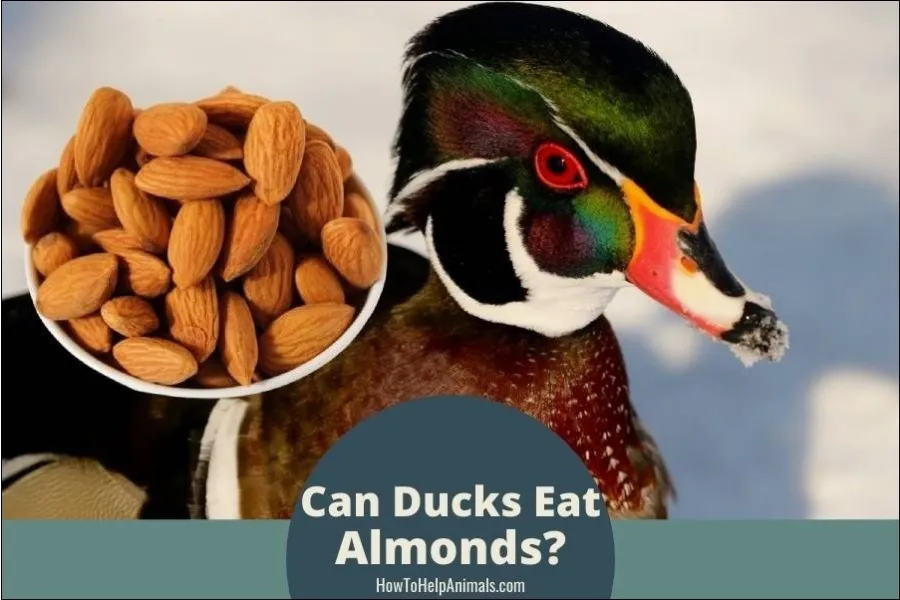
Did you know the largest producer of almonds in the world is the US? Over 57% of all grown almonds are produced in the United States. The production of almonds has skyrocketed over the last couple of years due to the increase in demand for different almond drinks. That got me thinking – is it only humans who can benefit from this excellent seed? I researched whether I can feed almonds to my animals and particularly my ducks.
Ducks can eat raw and roasted almonds and will benefit from them. Almonds have beneficial vitamins and minerals for the duck’s health. Ducks can eat almonds as long as they are chopped into smaller pieces and given in moderation. However, you should never feed salted or bitter almonds to ducks.
Almonds contain Folate, Phosphorus, Potassium, Magnesium, Zinc, Iron, Calcium, and lots more minerals and vitamins that benefit the duck’s health.
Almonds are a great way to add fat to your duck’s diet since they contain over 50% fat. However, since the number of calories in almonds is pretty severe, you will need to practice moderation.
Can ducks eat almonds?
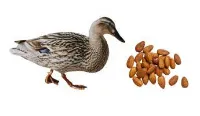
Ducks can eat both raw and roasted almonds and will help to improve the duck’s health. Both calcium and potassium, which are paramount in the duck’s health, are present in the top of nutrients listed in almonds.
You should never feed bitter almonds to ducks. Bitter almonds contain a toxin called glycoside amygdalin. The body breaks it down to several compounds – including hydrogen cyanide. Which is so toxic it can be lethal even to humans. Bitter almonds contain 50 times more cyanide than regular sweet almonds per kilo. Only a handful of bitter almonds can kill a small child.
If you want to feed almonds to ducks, you will need to stick to regular sweet almonds. You will also need to crush them before feeding. Otherwise, the risk of choking is too severe. Slivered almonds aren’t enough. Either crush them using a food processor on pulse mode or slice the almonds into thin pieces.
You will also need to feed almonds in moderation. Almonds are 592 calories per 100 grams which are almost half of a duck’s caloric budget. A daily dose of almonds can be healthy for your ducks, as long as you keep it moderate and crush the seeds before serving.
💡 Did you know almonds are considered seeds and not nuts? Learn more about what seeds and nuts ducks can eat here.
Almonds table of nutrients per 100g
| Nutrient (unit) | Sweet almond |
|---|---|
| Weight standard (g) | 100 |
| Energy (kcal) | 592 |
| Energy (kJ) | 2478 |
| Carbohydrates (g) | 0.5 |
| Fat (g) | 53.2 |
| Protein (g) | 20.67 |
| Fiber (g) | 18.7 |
| Water (g) | 3.72 |
| Alcohol (g) | 0 |
| Ashes (g) | 3.23 |
| Monosaccharides (g) | 1.07 |
| Disaccharides (g) | 2.56 |
| Sucrose (g) | 2.56 |
| Sugars (g) | 3.6 |
| Total saturated fatty acids (g) | 4.37 |
| Fatty acid 4: 0-10: 0 (g) | 0 |
| Lauric acid C12: 0 (g) | 0 |
| Myristic acid C14: 0 (g) | 0 |
| Palmitic acid C16: 0 (g) | 3.46 |
| Stearic acid C18: 0 (g) | 0.92 |
| Arachidic acid C20: 0 (g) | 0 |
| Total monounsaturated fatty acids (g) | 34.74 |
| Palmitic acid C16: 1 (g) | 0.25 |
| Oleic acid C18: 1 (g) | 34.48 |
| Total polyunsaturated fatty acids (g) | 11.65 |
| Linoleic acid C18: 2 (g) | 11.65 |
| Linolenic acid C18: 3 (g) | 0 |
| Arachidonic acid C20: 4 (g) | 0 |
| EPA (C20:5) (g) | 0 |
| DPA (C22:5) (g) | 0 |
| DHA (C22:6) (g) | 0 |
| Tiamin (mg) | 0.12 |
| Riboflavin (mg) | 0.6 |
| Vitamin C (mg) | 0 |
| Niacin (mg) | 4.17 |
| Niacin equivalents (NE / mg) | 7.6 |
| Vitamin B6 (mg) | 0.1 |
| Vitamin B12 (µg) | 0 |
| Folate (µg) | 47.2 |
| Retinol (µg) | 0 |
| Vitamin A (RE/µg) | 0.5 |
| β-Karoten (µg) | 6 |
| Vitamin D (µg) | 0 |
| Vitamin E (mg) | 25.2 |
| Vitamin K (µg) | 0 |
| Phosphorus (mg) | 587 |
| Iodine (µg) | 0 |
| Iron (mg) | 3.17 |
| Calcium (mg) | 296 |
| Potassium (mg) | 1010 |
| Magnesium (mg) | 273 |
| Sodium (mg) | 0 |
| Salt (g) | 0 |
| Selenium (µg) | 0 |
| Zinc (mg) | 3.2 |
| Cholesterol (mg) | 0 |
| Whole grains total (g) | 0 |
| Waste (shell etc.) (%) | 60 |
Can ducklings eat almonds?
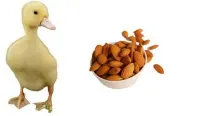
Ducklings can eat almonds after they’ve turned four weeks of age. Before then, ducklings need to eat special duckling feed with more protein. I’ve been using this duckling fodder for my ducklings.
After the ducklings have turned four weeks, you can gradually add crushed almonds to your duckling’s diet. However, it isn’t necessary to rush to incorporate almonds into their diet. The almonds can be an occasional treat first. Ducklings still need a high protein intake. However, almonds carry 20% protein, which is a good percentage to aim towards, but try to aim for less caloric foods with the same protein amount—otherwise, the risk of developing obesity at a young age increases.
🥬 Kale is a great vegetable that provides lots of good nutrients for your ducks. Find out what vegetables ducks can eatFruits and almonds go hand in hand. But did you ducks can’t eat all fruits? Find out which fruits you should never feed ducks. here.
Do ducks like to eat almonds?
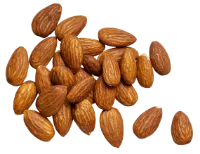
Ducks like to eat almonds, and especially if they are mixed with their other foods. A great way to mix almonds with other foods is to crush them using a food processor and mix them with oats. If it is the first time offering almonds to your ducks, it might be a good idea to mix with something they really like. Every time I try to incorporate new foods into their diet, I add them to green peas. The ducks don’t seem to ever get tired of peas.
Can ducks eat raw almonds?
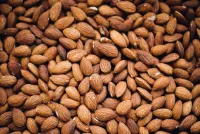
Ducks can eat raw almonds as long as they are fed in moderation. For good measure, it’s always better to feed them roasted almonds to decrease the risk of toxins. It would be best if you didn’t ever feed salted almonds either. The sodium dehydrates them and can cause kidney problems. The easiest option is to buy already roasted and unsalted almonds. I usually get 2lbs bags of these almonds. I like them because the bag is resealable and the only thing to do is to crush them.
🍋 Fruits and almonds go hand in hand. But did you ducks can’t eat all fruits? Find out which fruits you should never feed ducks.
Can ducks eat roasted almonds?
Ducks can eat roasted almonds. Roasted and unsalted almonds are actually the preferred way to feed ducks. Moderation, crushed, unsalted, roasted are the things to be aware of when feeding almonds to ducks. Peanuts however need to be roasted before the ducks can eat them.
Can ducks eat moldy almonds?
You should never feed ducks moldy almonds. You should never feed any moldy food to any animal. Mold is toxic and can be lethal. Not only from eating it but also from inhaling the spores. Throw away the moldy almonds.
🐖 Ducks enjoy eating live feed sometimes. Do you know what animals ducks eat?
Can ducks eat slivered almonds?
Ducks can’t eat slivered almonds. Slivered almonds are too big for them to eat and are a choking hazard. It’s better to slice them into thin pieces or crush them in a food processor. Flaked almonds are also a great option.
Safe ways to feed almonds to ducks
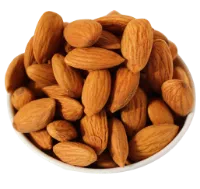
When feeding nuts and seeds to ducks, safety is important. Since we are speaking about other’s well-being, it’s important to do what’s right for them.
1. Feed ducks crushed/flaked/sliced almonds
When feeding ducks almonds, the most important thing is to make it smaller for them. Almonds are too big for them to eat. Ducks don’t chew their food but instead swallow everything whole, which increases the choking risk.
An easy way to crush almonds is to put the nuts into a ziplock bag and remove the air. Ziploc it, and smash it with a hammer. When all nuts are crushed into small pieces, you are fine. That’s what I do with the almonds I buy.
2. Feed in moderation
Almonds are pretty high in calories and can easily become a caloric surplus if given too much. It’s important to measure all foods you give your ducks before feeding them. Otherwise, the ducks can be both malnourished or overweight. I meal prep on Sundays, weigh everything, and prepare food bags for every day in the upcoming weeks.
3. Feeding unsalted almonds
It’s important you feed unsalted almonds to your ducks. Too much sodium in their diet may cause kidney problems which can be very painful.
4. Feed roasted almonds
Roasted almonds are the preferred way to feed almonds to ducks. In small amounts, they can eat regular almonds, but it’s not recommended. Have the habit to always buy roasted and unsalted almonds. Never bitter almonds.
5. Feed with water
Ducks prefer their food in the water. It helps to ingest the food and makes it easier to swallow. However, you shouldn’t throw the almonds into the same water they swim in. It’s better to feed in dedicated buckets filled with water. Otherwise, it can cause algae growth.
6. Feed with their usual foods
If you are to incorporate almonds into your duck’s diet, it’s a good idea to mix with other foods—especially their favorite foods in the absolute beginning. Crush the seeds up and add them to their daily duck pellets and other food.
🥗 When you are making a salad you can add some nuts on top. Not all nuts are suitable for ducks. Check what nuts you can feed your ducks.
Unsafe ways to feed almonds to ducks
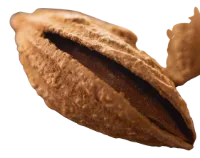
Some ways are better than others, and some ways are best avoided. Below are some ways you should avoid when feeding almonds to ducks.
1. Feeding bitter almonds to ducks
You should never feed bitter almonds to ducks. Bitter almonds have 50 times more cyanide per kilogram than sweet almonds. A handful of bitter almonds is deadly to a child. Imagine how little it requires to be lethal to a duck.
2. Feeding salted almonds to ducks
You should avoid feeding salted almonds to your ducks. Sodium is best to avoid in a duck’s diet since it can cause dehydration and cause kidney problems.
3. Not roasted
When you roast and toast nuts and seeds, you remove toxins. While there aren’t too many toxins in almonds, and a small amount wouldn’t kill your ducks, it is still best to avoid regular almonds and always give them roasted. To roast almonds, you only need to put them in the oven at 325° F for 9-12 minutes. Don’t forget to crush them afterward.
4. Throwing almonds into their swimming water
If you visit the park or pond and want to give the duck, a treat-almonds are a great snack. However, you shouldn’t throw the seeds into the water they swim in. Uneaten foods dissolve and cause algae to grow. When a certain species becomes overpopulated, it disrupts the ecosystem and can cause species to go extinct. It’s much better to throw the food on the ground for them to forage. That way, their instincts to forage for food get activated.
5. The almonds aren’t crushed
Almonds are pretty large, and even slivered almonds are too big for ducks to eat. Before you feed ducks almonds, they need to be crushed, sliced, or flaked. Otherwise, the risk of asphyxia is too high.
6. Too much almonds
It’s easy to go overboard when feeding nuts and seeds to ducks. Due to the high amount of calories in almonds, you will need to feed in moderation. In the same way, humans gain weight, and ducks also gain weight. If you provide them with excess calories, it converts into fat.
How often can I feed almonds to my ducks?
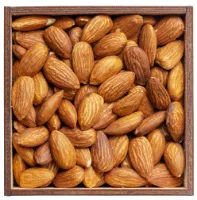
You can feed almonds to ducks as often as you would like. It’s important to adjust to the other foods in their diet if you want to add almonds to their daily feed. You don’t want to give them a caloric surplus if you want your ducks to be healthy. There are people who feed almonds as a weekly treat; others have the almonds in their daily diet. Both ways require adjustments to the duck’s diet.
How many almonds can I feed my ducks?
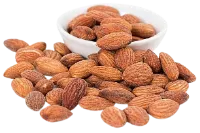
The amount of almonds you can feed your ducks is determined by the other food in their diet. If you want to add a certain amount of calories in the form of almonds, you will need to decrease the same amount of calories somewhere else and still ensure they aren’t losing any micronutrients.
🥡 Do you want to treat the ducks with something from the fridge? Find out what human foods you can give ducks here.
Health benefits for ducks by eating almonds
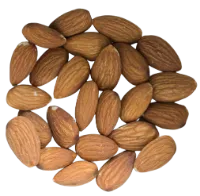
Almonds contain Folate, Phosphorus, Potassium, Magnesium, Zinc, Iron, Calcium, and lots more minerals and vitamins that benefit the duck’s health. Almonds are an easy way to incorporate more micronutrients into the duck’s diet.
Folate in almonds for ducks
Folate (Vitamin B9) is important in red blood formation and healthy cell growth. A folate deficiency can lead to anemia. Foods rich in folate that ducks can eat are broccoli, Brussels sprouts, kale, and peas.
Phosphorus in almonds for ducks
Phosphorus helps maintain healthy bones and teeth, aids in keeping the kidney healthy, regulates the balance of hormones, and much more. Phosphorus can be found in green beans, nuts, soy, and legumes.
Potassium in almonds for ducks
Potassium is paramount in a duck’s diet, as well as Calcium. Potassium’s role in the body is the regulate the fluid balance and help different cells. For example, nerve cells or muscle cells. Examples of foods rich in potassium ducks can eat bananas, broccoli, brussels sprouts, peas, lentils, nuts, potatoes, and tomatoes.
Magnesium in almonds for ducks
A magnesium deficiency may lead to hypertension, insulin resistance, heart disease, and headaches. Magnesium can benefit strong bones, the activation of vitamin d, and provides a more restful sleep. Foods rich in magnesium ducks can eat nuts, beans, okra, tuna, and bananas.
Zinc in almonds for ducks
Zinc helps the immune system and metabolism function. Zinc is also crucial for wound healing and the sense of taste and smell. Foods rich in zinc ducks can eat oysters, lentils, tofu, oatmeal, and mushrooms.
Iron in almonds for ducks
Iron is important for hemoglobin formation, brain function, muscle function, and much more. Iron is found in sweet potatoes, peas, oats, and tofu.
Calcium in almonds for ducks
Ducks benefit greatly from eating calcium-rich food. Ducks require calcium for developing healthy eggs and eggshells. 97% of the eggshell is made out of calcium. If you have egglaying ducks, the intake of calcium is essential. Foods ducks can eat that are rich in calcium are soy, broccoli, pumpkin, green beans, and celery.
Conclusion
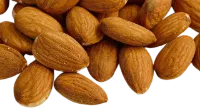
Ducks can eat almonds and thrive doing so. Almonds have a lot of nutrients that benefit the duck’s health.
Ducklings can eat almonds after they’ve turned four weeks of age. Until then, they will need to eat their regular duckling feed. You can gradually add almonds into their diet after that.
Both adult ducks and ducklings like to eat almonds.
You must crush the almonds before you give them to your ducks. Otherwise, there’s a choking hazard.
Safe ways to feed almonds to ducks
- Feed ducks crushed/flaked/sliced almonds
- Feed in moderation
- Feeding unsalted almonds
- Feed roasted almonds
- Feed with water
- Feed with their usual foods
Unsafe ways to feed almonds to ducks
- Feeding bitter almonds to ducks
- Feeding salted almonds to ducks
- Not roasted
- Throwing almonds into their swimming water
- The almonds aren’t crushed
- Too much almonds
You can feed almonds to ducks as often as you would like. It’s important to make adjustments to the other foods in their diet if you want to add almonds to their daily feed. The amount of almonds you can feed your ducks is determined by the other food in their diet.
